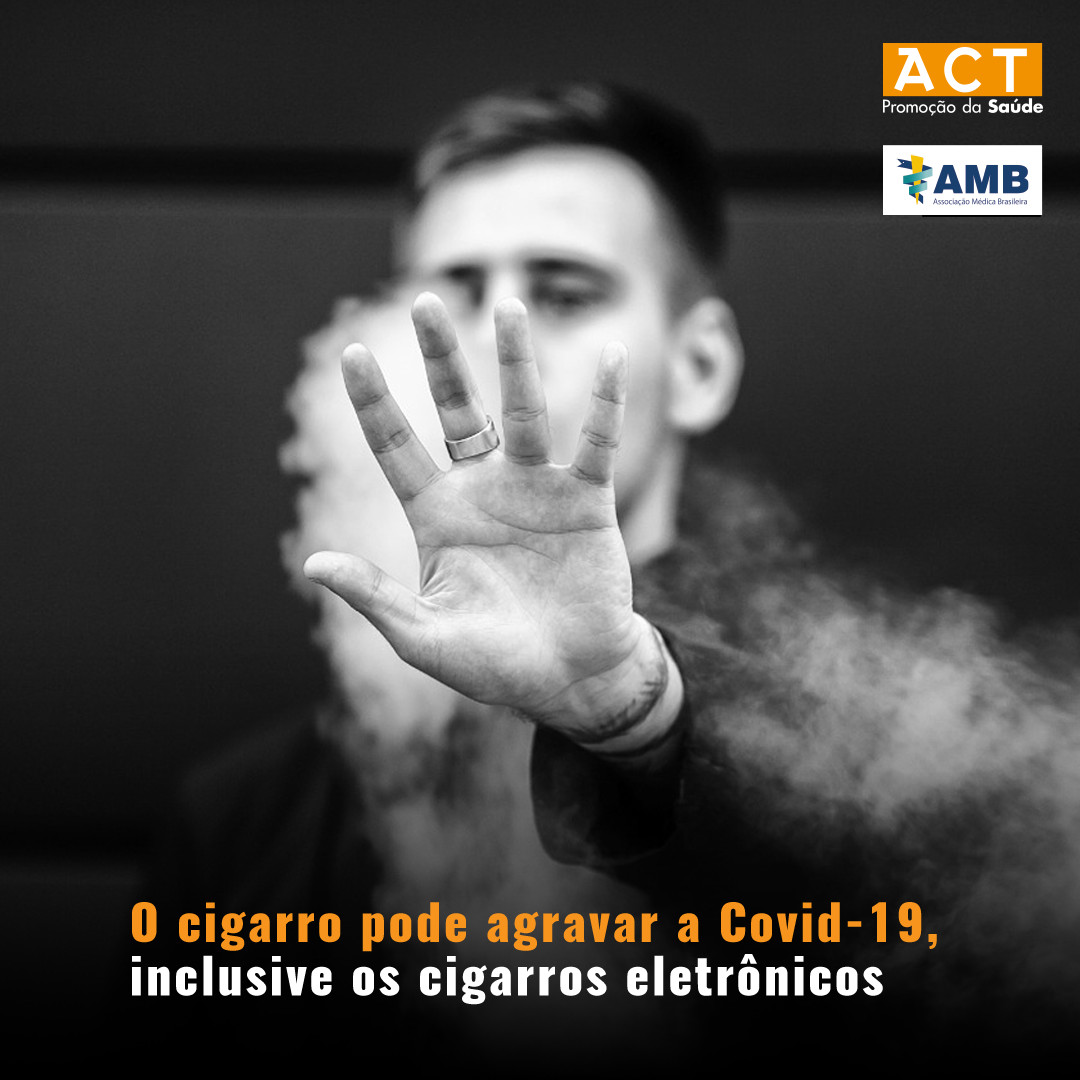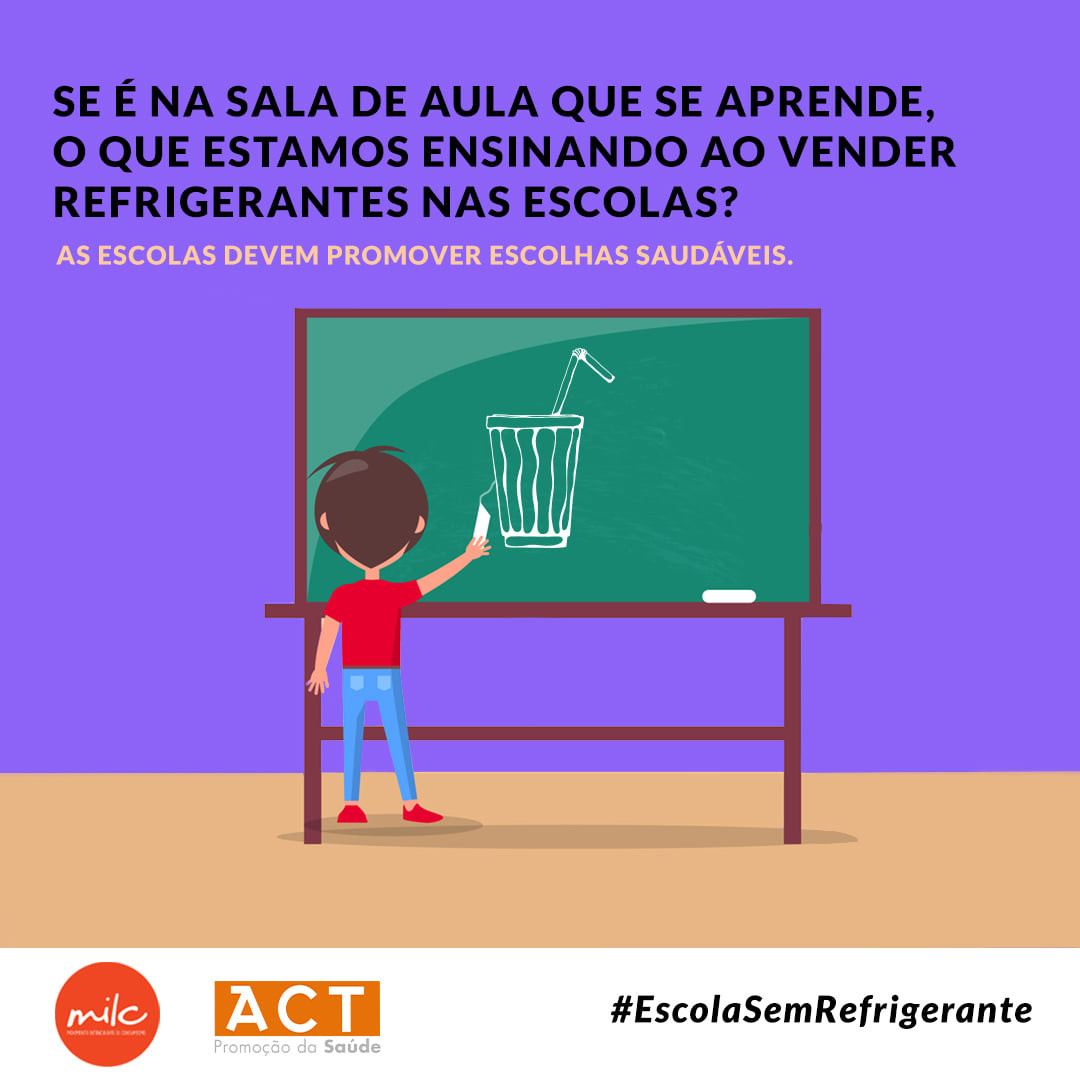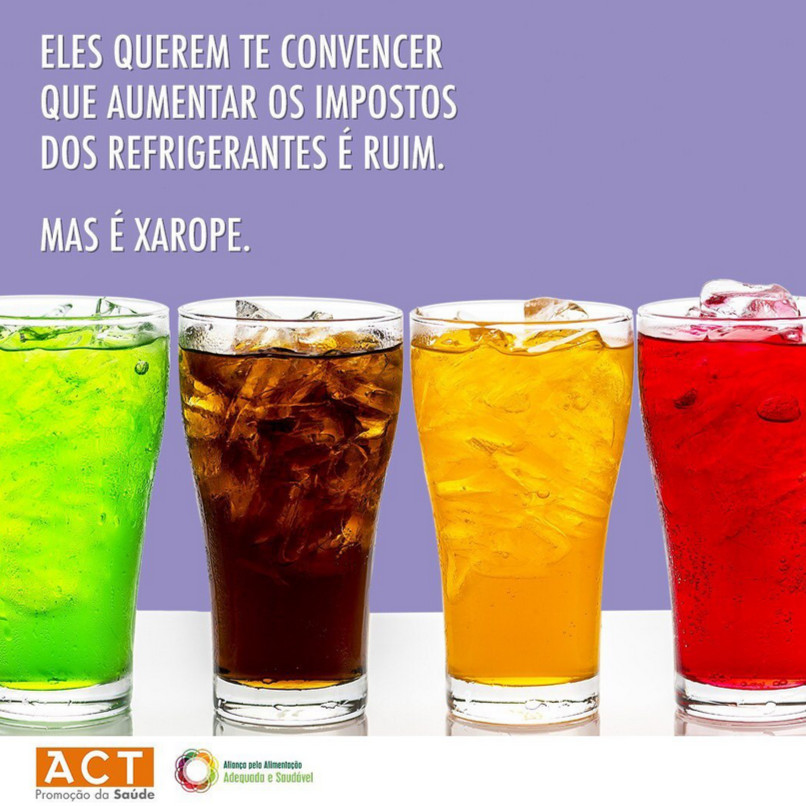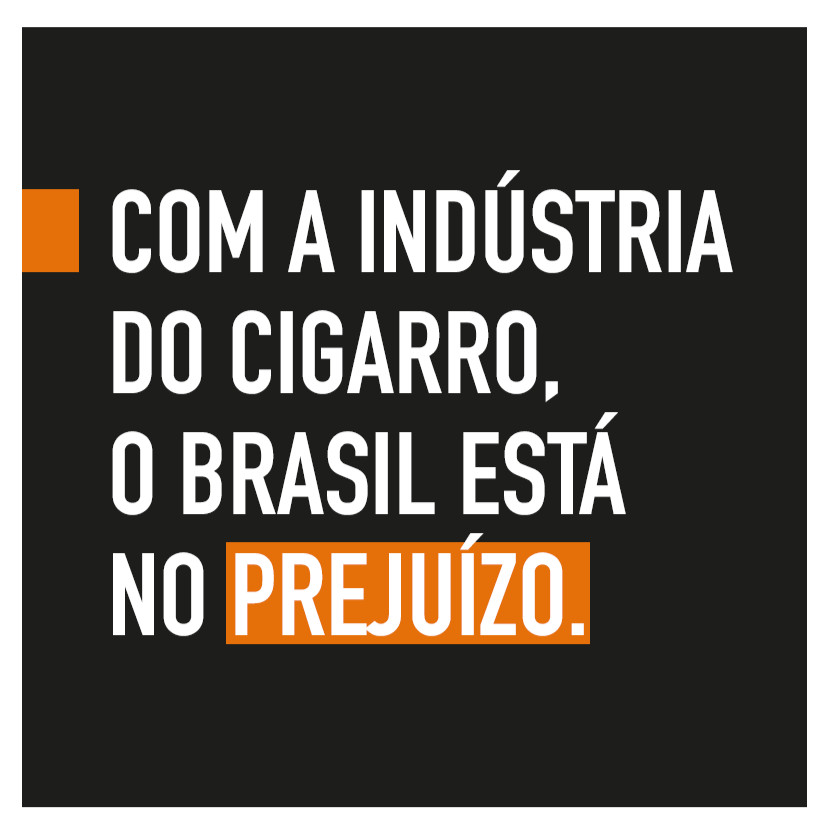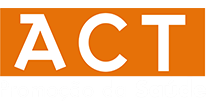Retrospective: 2023 in review
04.01.24ACT
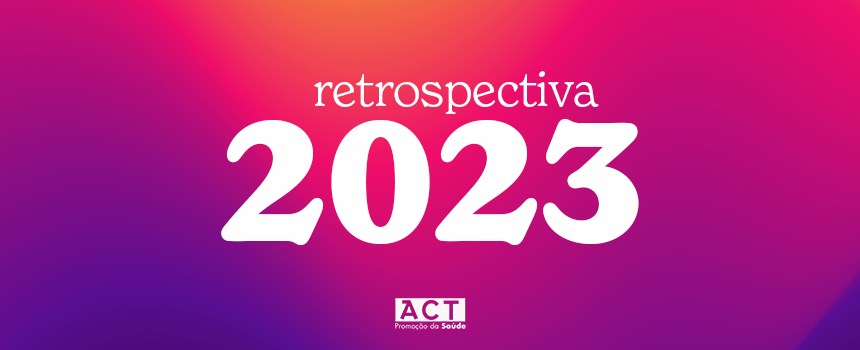
A message from ACT’s Collegiate Board
In 2023, our journey completed 17 years, and our advocacy on behalf of NCDs prevention was expanded through the inclusion of a new risk factor: alcohol control, which, just like tobacco and ultraprocessed foods, generates heavy costs to health and to society as a whole.
Cigarettes, alcohol and agribusiness sectors are part of a problematic production chain that involves environmental impacts and human rights violations. Now, the product's disposal is also added to the list of expenses - and, with our current tax system, the ends do not meet.
The tax reform could possibly implement the so-called sin taxes in these products, making them more expensive and, as a result, less available. At the same time, more resources could be raised and applied in health initiatives. We have continued to monitor and advocate on behalf of the reform since the first draft was proposed, including during discussions about the project in the Chamber of Deputies and in the Senate. We are part of a coalition that advocates for a healthy, sustainable, and solidary tax reform and that is the main voice of civil society on the matter.
Meanwhile, on Instagram, our main social media channel, we have had a 45% raise on followers and a 158% raise on the reach of our posts. We also got over 9 million reach on Facebook and over 224,5 thousand on X.
ACT’s blog, newsletter and e-mail marketing have great opening and reading rates, which shows that we are an information source for the general population, influencers and decision makers.
Our appearance in articles and interviews are also a proof of our credibility among media vehicles. Even when we are not namely mentioned in a news article, we can see that the themes we work with are receiving attention. We have been publishing at least two opinion articles and eight news stories by month in media vehicles of national reach. We have strengthened old partnerships, such as with O Joio e o Trigo and Ciência Suja podcast, and established new ones, including with Olá Ciência, which allowed us to make innovations to ensure that our technical productions would be able to reach a broader, non-specialized audience.
Throughout the year, we have been leaders of two mass media campaigns and established partnerships with other organizations and advertising agencies, impacting over 60 million people in different Brazilian states, mainly São Paulo, Rio de Janeiro, and Distrito Federal.
Our team has also grown: we are now 32 people acting across the entire national territory. ACT’s diversity policy, which was developed during 2022 and launched in January, continues to be implemented. A Diversity Committee was created, and it meets every fortnight. At least once a month, training meetings are promoted for the entire team.
Our governance structure highlights our five main strategic areas: advocacy, legal, communication, coalition building and industry monitoring. The management model promotes synergy, integration and sharing between the food, tobacco, alcohol, 2030 Agenda and NCDs programs.
In May, we actually received an award promoted by WHO on World No Tobacco Day due to the synergy between the tobacco control and food programs. Moreover, along with Bloomberg Philanthropies, ACT will begin to finance projects that support and strengthen tobacco control in Brazil.
We continued to work with training projects, such as workshops, webinars and courses. Our digital learning platform was used by 850 students from two courses on public policies and sustainable development.
We are developing an action plan to the Health Promotion Network, aiming at mobilizing and strengthening coalitions, organizations and people to act in a collaborative and inclusive way in favor of environments that promote healthy and sustainable choices. It was a joy to be able to gather over 160 people in our XVI Strategic Alliances Seminar, in Brasília, which once again included advocacy actions in the National Congress and public hearings in both Houses.
Some of our achievements are highlighted in the following articles. We would also like to thank our financers, partners, and everyone that accompanies us in our journey for the support and recognition.
Happy holidays and an amazing 2024.
Paula, Mônica, Anna, Fabiana, Adriana and Daniela

Ideathon
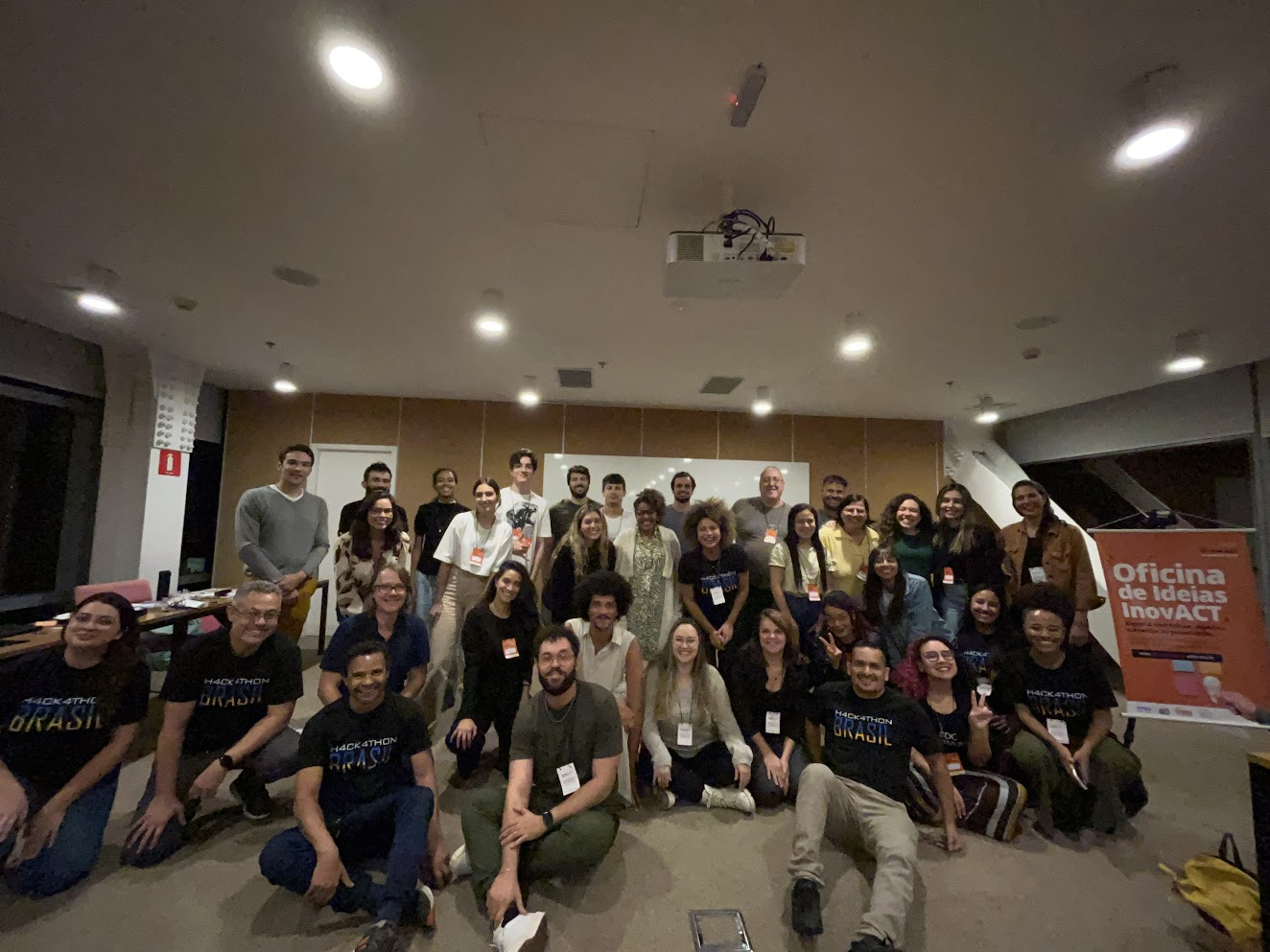
To stimulate different ideas and outside-of-the-box thinking, ACT organized InovACT Ideathon, which addressed the impacts and challenges of working with communication regarding electronic cigarettes. The event was held in April and conducted by Hackathon Brasil, with an emphasis on design thinking.
Two live transmissions were held before the event, in which twenty people were split into six teams. The main conclusions drawn were the following: the importance of including young adults and adolescents in the development of awareness campaigns; using positive approaches in the communication strategies; developing robots and games on the topic; identifying digital micro-influencers to help spread the message; working with schools to avoid initiation and with environments such as gyms, as they are related to the search for a healthy lifestyle.
Public hearing on electronic cigarettes

In December, we accompanied the last meeting of Anvisa’s Collegiate Board, in which it was decided that a public hearing will be held to discuss the new text of the rules applied for electronic cigarettes, which are currently defined by Resolution 46, of 2009 - that forbids sales, imports, and advertising of electronic smoking devices, including electronic cigarettes, heated tobacco products and accessories and refills for these products.
We published a text about Anvisa’s decision, which is supported by us and by medical societies and health workers.
The public hearing will be available until February 12, 2024, and our contributions will be shared.
Less tobacco, more food
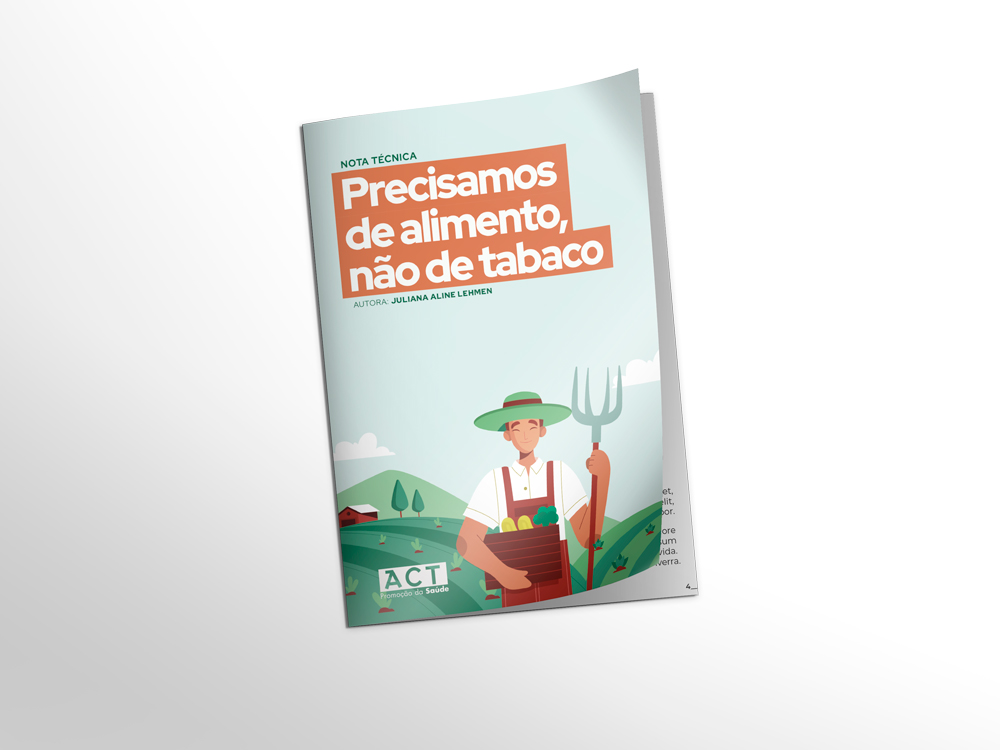
While facing hunger and food insecurity, Brazil produces tobacco in a land extent which is equal to the one used to produce every vegetable, legume and fruit consumed in the country. If different foods were produced instead of tobacco, it would be beneficial to the fight against food insecurity and hunger, tobacco farmers’ quality of life would improve, and there would be less costs associated with tobacco-related diseases.
This is the conclusion of a study conducted by the economist Valter Palmieri Jr, from the State University of Campinas (Unicamp), published on No Tobacco Day. Besides being necessary and urgent, this shift is part of the commitment made by Brazil in 2005, when the country became a Party of WHO’s Framework Convention for Tobacco Control (FCTC), an international health treaty.
Biologist Juliana Lehmen also worked with the subject and concluded that 38% of small rural producers households face severe food insecurity (when there is no food) or moderate insecurity (when the amount is insufficient), even though the country has a huge agricultural production. Around 70% of the families that plant tobacco want to shift their productions due to health issues, excessive use of pesticides and strenuous work.
The two studies were used as arguments in a request made to the Ministry of Agrarian Development, asking it to reinstate the National Diversification Program.
Tobacco industry interference in public policies
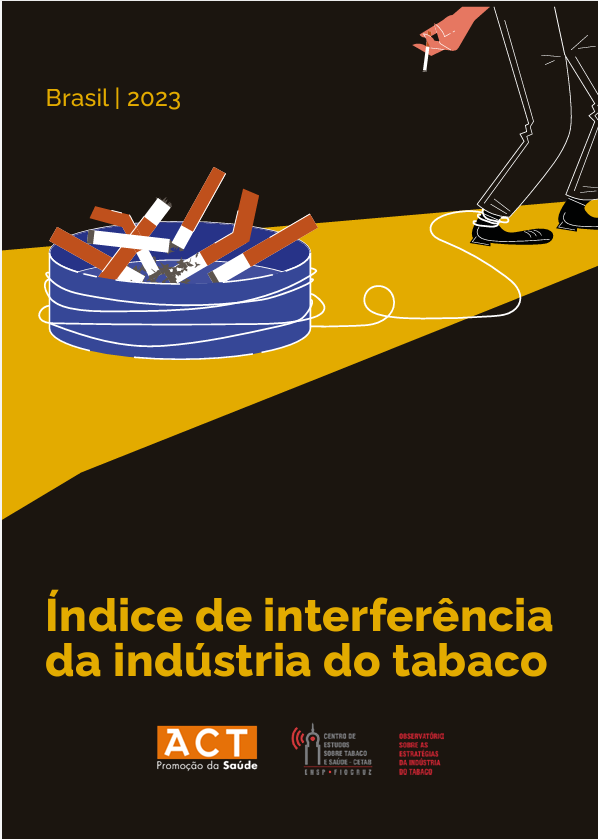
Brazil is ranked 59th among 90 countries in the third edition of the Global Tobacco Industry Interference Index, a worldwide study that evaluates if public policies are protected from conflicts of interest with the tobacco industry and what the countries are doing to prevent such interference. The Brazilian Index was produced by ACT Health Promotion and the Center for Studies on Tobacco and Health (CETAB) of the National School of Public Health
(ENSP)/Oswaldo Cruz Foundation (Fiocruz), which houses the Observatory
on Strategies of the Tobacco Industry.
In this edition, interference increased in almost every aspect evaluated, specially industry participation in public policies development. In Transparency, for example, it was verified that even though government members’ agendas are usually public, information on the topics discussed during meetings are not always readily available. Undisclosed meetings between government members and the Tobacco Sectorial Chamber were also identified. Regarding conflicts of interest, it was possible to see that people linked to the tobacco industry still make individual donations to political campaigns, as donations by companies are prohibited by law.
A plastic pandemic?
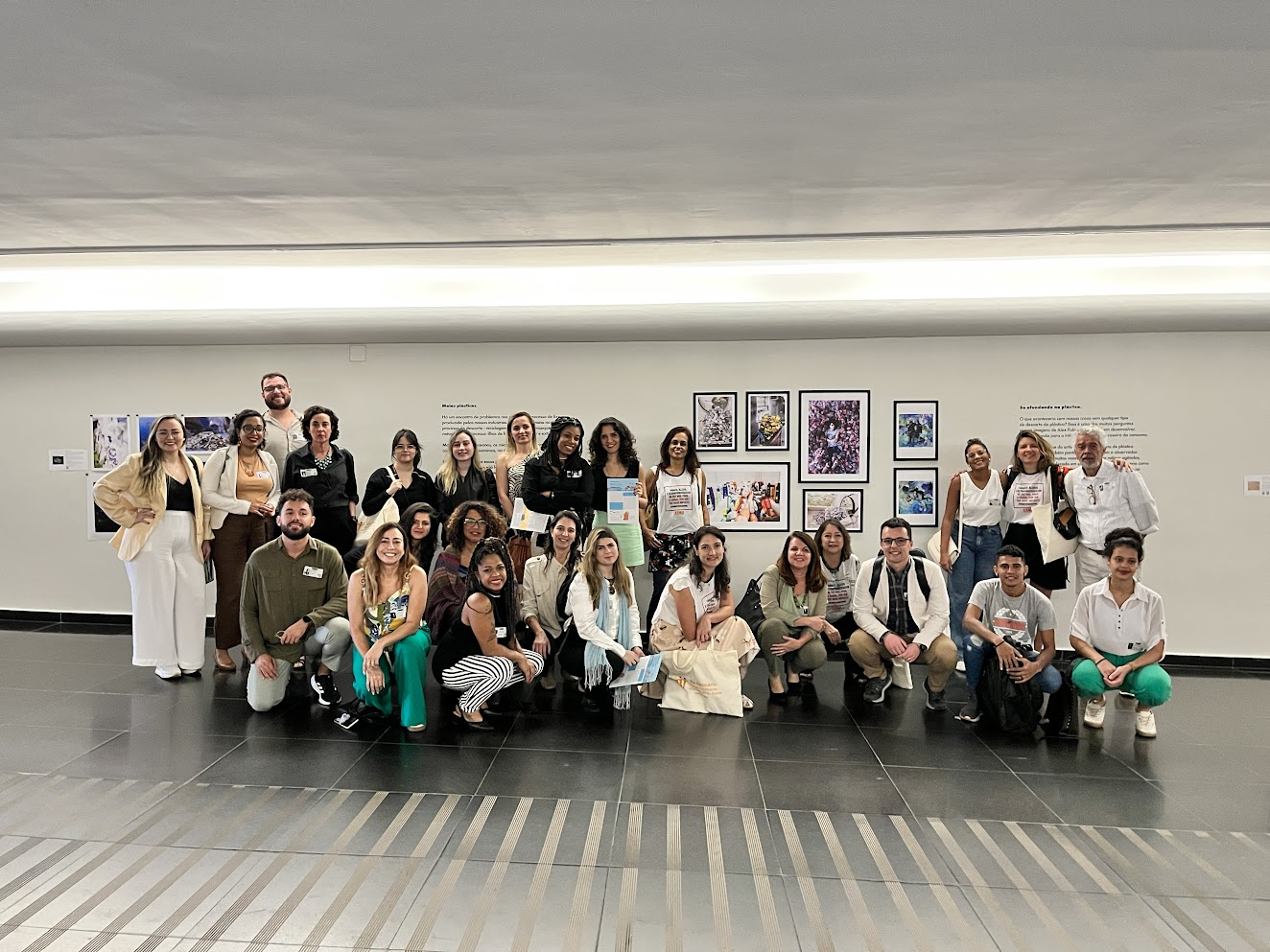
While promoting products that are harmful for health, the tobacco, ultraprocessed, and alcohol industries are leaving behind a trail of plastic pollution - also harming the planet. This matter was discussed in an exhibition and a seminar held in the Chamber of Deputies in August. A plastic pandemic?, the photography exhibition organized by ACT in the hallway of the Chamber, presented images from the contest “Cigarette butts are plastic”, also organized by ACT, ,and photos provided by the Voz dos Oceanos movement and from the collection of photographer Alex Fisberg.
Along with Idec (Brazilian Institute for Consumer Defense), Oceana and 60 other organizations, ACT also took part on the campaign Stop the Plastic Tsunami, which aimed at drawing attention of decision makers, legislators and civil society to the importance of approving bill 2524/2022, which is currently being discussed and proposes the reuse of compostable plastic and the elimination of disposable plastic.
Cigarette butts are plastic
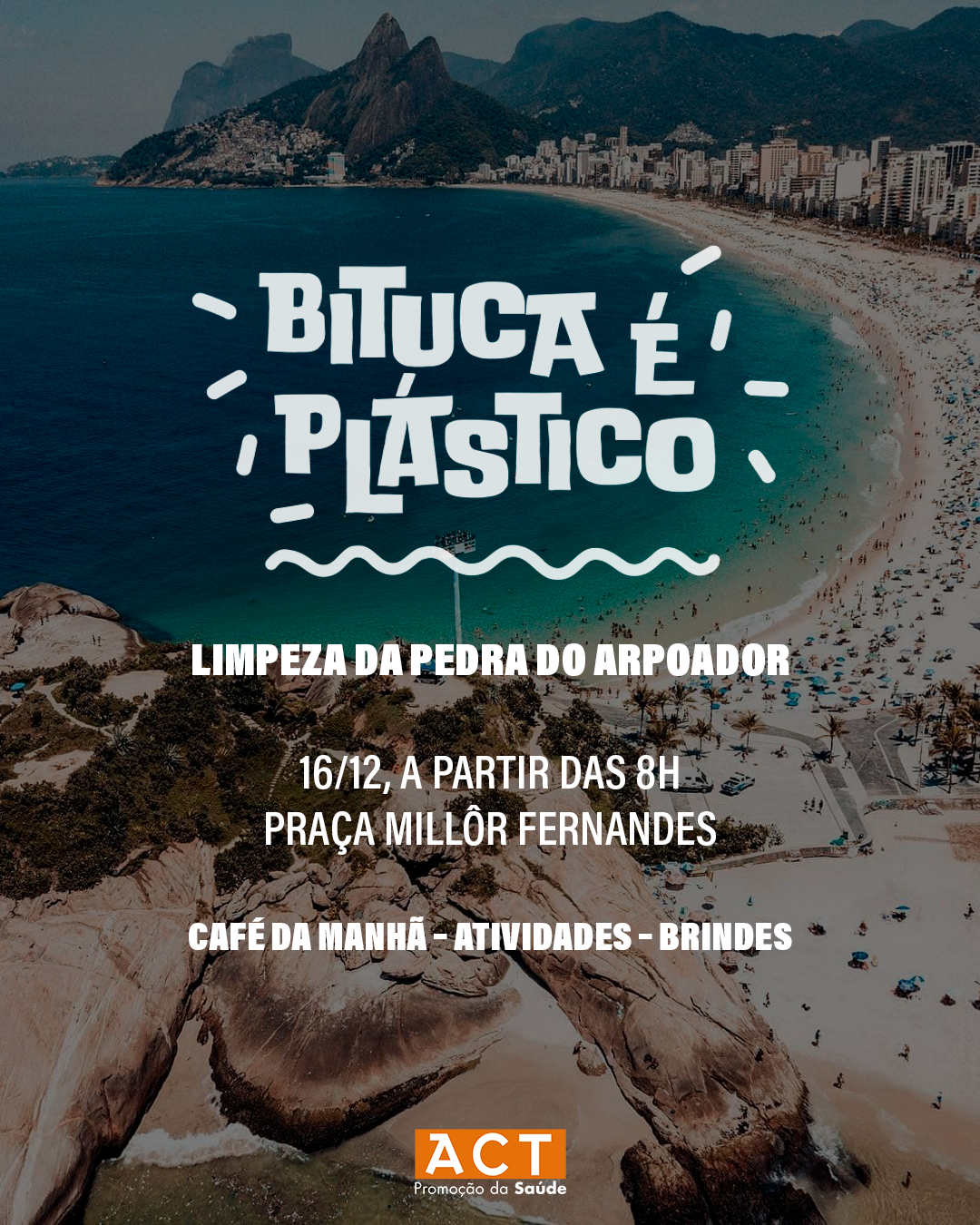
Researchers linked to the Federal University of São Paulo, supported by ACT and the Institute for Global Tobacco Control (IGTC) from Johns Hopkins Bloomberg School of Public Health, published a report addressing the environmental impact of inadequate disposal of cigarette filters and an estimate of illicit market, based on a study performed in urban areas of Guarujá, a city in the state of São Paulo.
For the study, over 4.3 thousand cigarette butts were collected in public streets. They contain thousands of toxic substances, such as metals, BTEX, hydrocarbons, nitrogenous compounds and aromatic amines, among others, and are the main type of trash produced by humans. It is estimated that, out of 5.5 trillion cigarettes produced every year, 4.5 trillion butts are inadequately disposed of.
To draw attention to these findings, at the end of the year ACT organized a crossing in Rio, from Posto 5 to Arpoador, along with Equipe 15. Later on, an event was held in Pedra do Arpoador along with Bota Pra Girar, a movement that promotes beach cleaning and waste recycling.

The legacy of the tax reform
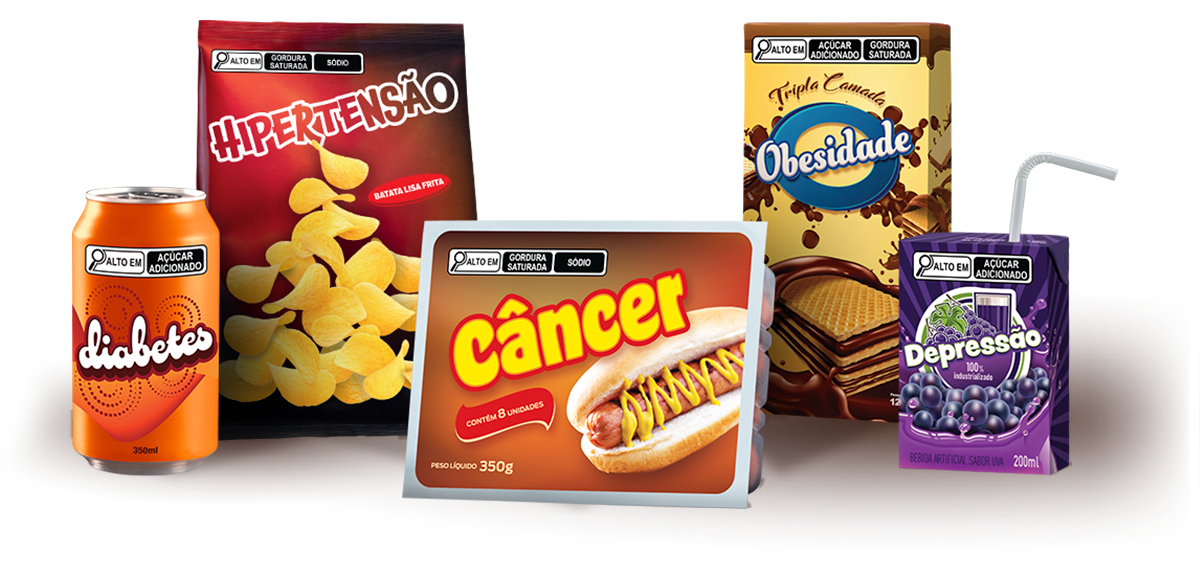
One of the main challenges that ACT faced throughout 2023 was to disclose to the general population and decision makers the importance of the tax reform to leave a legacy to health.
In November, after we organized two panels with Valor newspaper to discuss with experts the impacts of taxes on health, we held a public act in the Salão Verde of the Chamber of Deputies. Three documents were delivered to the congressmen: the manifests for a healthy, sustainable and solidary reform, signed by over 130 entities, for an adequate and healthy eating, with over 120 organizations and research groups, and the Doce Veneno petition, with over 110 thousand signatures.
Lancet Series on the commercial determinants of health
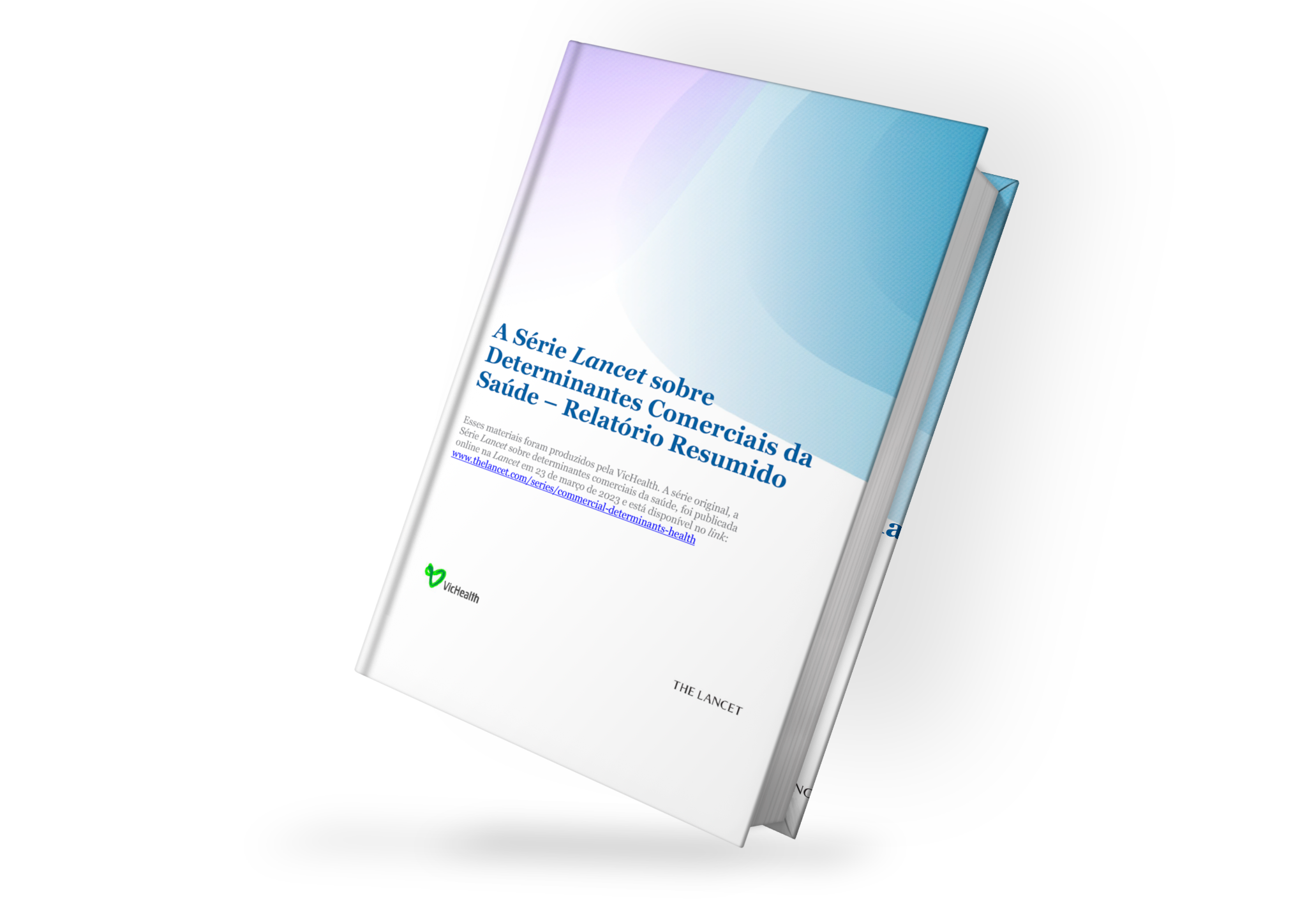
Many factors influence health and the environment, impacting society as a whole, and some of them are well-known products and practices. The NCDs epidemic and the climate emergency show that actions need to be taken now.
Because of that, ACT supported and translated the Lancet Series on the commercial determinants of health, which includes three articles that can be used as tools to face NCDs, specially by advocates, researchers and decision-makers. The series also presents corporate models that would be beneficial to the people and the planet.
Blackwashing Report

The report Blackwashing: are corporations engaged in the racial cause?, launched in the second semester after a meeting with leaders of the black movement, showed that the antiracist commitments made by the industries of harmful products is just a strategy to increase their sales among the black population, which is also the most affected by NCDs associated with the consumption of tobacco, alcoholic beverages and ultraprocessed foods.
In its introduction, the report gathers data on the prevalence of chronic diseases and exposition to risk factors among the black population. According to the 2019 National Health Survey, 28.6% of the black population consumes sugary foods on a regular basis, while only 15.7% of the white population reported the same. The survey also showed that the smoking prevalence is higher among black and brown people (13.7% and 13.5%) than white people (11.8%). Moreover, according to Vigitel 2018, 19.2% of the black population presents abusive alcohol consumption, in comparison to 16.6% of the white population.
Soy study and tax benefits

The country's tax policy is highly beneficial to the soy production chain, with the estimated tax exemption for the production of this commodity being R$ 57 billion in 2022. This is one of the conclusions of the study "The cost of soy for Brazil", which was published by ACT in partnership with the Institute for Democracy and Sustainability (IDS), the Observatory of Sociobiodiversity Economies (ÓSocioBio), the Brazilian Institute for Consumer Protection (Idec), WWF-Brazil and the Society, Population and Nature Institute (ISPN). Led by the economist Arnoldo de Campos, the researchers mapped and calculated the country's tax expenditure on the soy production chain.
Analyzing the tax exemption at the state level, according to the survey, in Mato Grosso alone the ICMS exemption on soy amounts to almost R$ 8 billion per year. It was a successful policy at the time, but it needs to be reviewed in order to return part of the investments that the country made to reach its current levels of development and competitiveness.
Advertising to children is illegal

Advertising, as communication experts know well, aims to stimulate the consumption of goods and services. It goes well beyond the dissemination of information - it exists to convince the audience to consume a certain product or service, following a trend, thus impacting behavior.
In a partnership with Alana Institute and Idec, ACT launched “Advertising to children is illegal in Brazil” in a webinar held by Migalhas, a legal news vehicle. The book analyzes advertising for children in the Brazilian legal system and gathers precedents from the Superior Court of Justice and the Federal Supreme Court, both of which recognize the abusiveness of advertising aimed at children. One of the highlights is the advertising of ultraprocessed foods and its impact on children's health. The World and Pan American Health Organizations (WHO and PAHO) and the United Nations Children's Fund (Unicef) recognize that any and all strategies to advertise unhealthy foods for children and adolescents are a public health issue and, due to the greater vulnerability of this group and the child obesity pandemic, countries need to protect children from it.
Healthy taxes – A dialogue between law, health and economics
This is the title of the book organized by Adriana Carvalho and Tathiane Piscitelli, lawyer and professor of the Getúlio Vargas Foundation’s São Paulo Law School, launched at the end of the year.
The book, published by Thomson Reuters/Revista dos Tribunais, includes prefaces by Denise Lucena, Law professor at the University of Ceará (UFC), and Diogo Coutinho, Law professor at the University of São Paulo (USP). The texts highlight the importance of increasing taxes for tobacco, alcoholic beverages, ultraprocessed products and pesticides, also recommending that the resources obtained could be allocated to the National Health Fund. At the same time, the collection highlights that harmful products should not receive any type of tax benefit and suggests the adoption of tax policies to relieve taxes on healthy foods.
Sweet Poison and the risk of ultraprocessed

Sweet Poison (Doce Veneno) was our biggest and longest campaign. It addressed healthy eating and tax reform and had two editions, between May and November. It invited the public to sign an online petition directed to congressmen, requesting the tax reform to benefit healthy foods and increase the taxes on ultraprocessed products.
The videos, radio spots and visual materials from the campaign were exhibited during prime time on open and closed TV stations - such as Rede Globo, Band, GloboNews, BandNews and CNN -, radio stations, newspapers, digital panels in airports, shopping malls, transport stations, and on websites and social networks. As a result, hundreds of thousands of people saw the petition, and over 113 thousand signatures were gathered.
The first phase of the campaign had the motto “Science warns: ultraprocessed foods are harmful for your health”. It showed packages of soft drinks, sausages, biscuits and chicken nuggets with warnings about the diseases associated with these products. The campaign video featured researcher and professor Carlos Monteiro, from the University of São Paulo. The second phase highlighted the “ultraprocessed foods spree in tax reform”, drawing attention to the pressure put on by the industry to obtain favorable tax treatment for ultraprocessed products, despite the negative externalities that their products cause to health and the environment.
Truths that are hard to swallow

The campaign Hard-to-Swallow Truths, a partnership between ACT and Idec, disclosed the inconsistencies between the advertisements produced by the food and beverage industries and the impacts of their products on society.
Between April and May, the campaign's video and posts were viewed more than 59 million times, shedding light on hidden practices of large ultraprocessed foods and beverages corporations to try to interfere in public food policies and increase their profits - to the detriment of the health of the population.
In the campaign’s website, you can learn more about the strategies through the Big Food Dossier.
Healthy eating in schools: a lesson for life
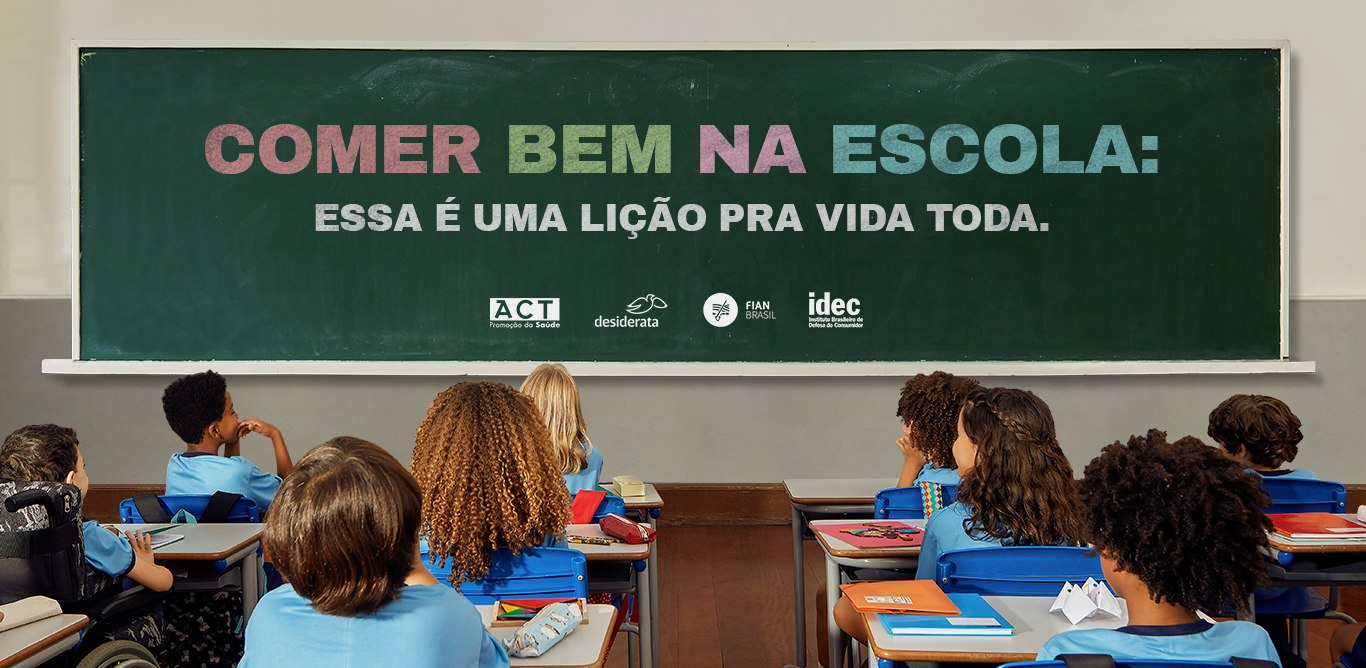
Healthy eating in schools entered ACT’s agenda through the campaign Healthy eating in schools: a lesson for life, another partnership with Idec, FIAN Brasil and Desiderata Institute.
There were two phases, in June/July and in November. 20 million people were impacted with a message about the importance of schools in promoting healthy eating, without ultraprocessed foods. The pieces included videos for open and closed TV stations, radio spots, and arts on social networks, digital media and panels and urban furniture in Rio de Janeiro, São Paulo and the Federal District.

Even though it causes a huge impact, alcohol still does not get enough attention from the government. The normalization of its consumption, along with the strategies used by the alcohol industry to promote and sell their products, makes this a global challenge for public health. Contrary to common belief, recent studies supported by the World Health Organization show that there is no safe amount of alcohol intake.
To support governments to reduce abusive alcohol consumption, WHO launched the SAFER initiative in 2018. It includes the following measures:
Strengthen restrictions on alcohol availability
Advance and enforce drink driving counter measures
Facilitate access to screening, brief interventions and treatment
Enforce bans or comprehensive restrictions on alcohol advertising, sponsorship, and promotion
Raise prices on alcohol through excise taxes and pricing policies
In the first half of this year, a group of organizations such as ACT, Vital Strategies and the Catholic University of Brasília (UCB), started to work on this issue in a project called RESET alcohol, which aims to implement regulatory policies.
The project seeks to offer technical support to government bodies and boost the implementation of effective regulatory policies, prioritizing actions in key areas such as taxation, advertising restrictions, and reduced availability.
ADVOCACY HIGHLIGHT: TAX REFORM
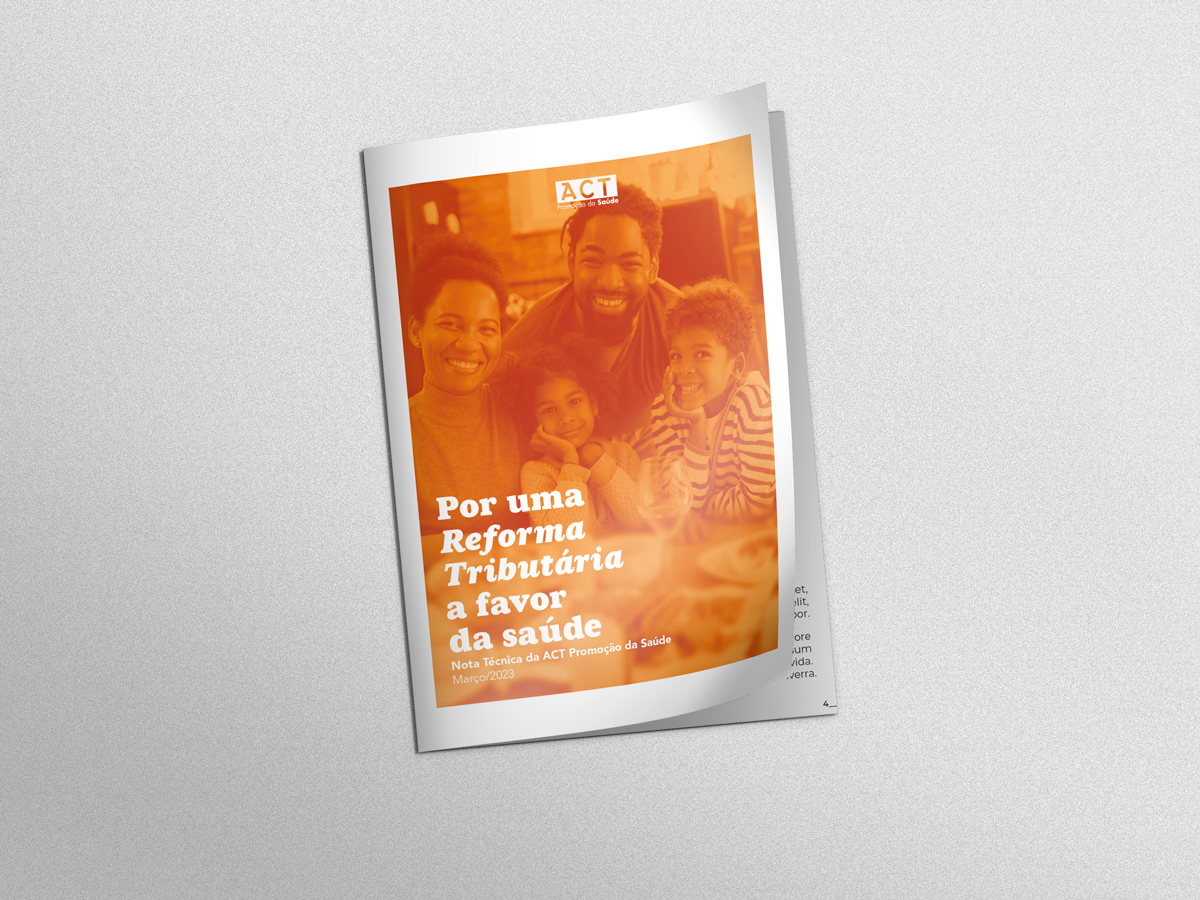
The main and most challenging agenda this year was tax reform, which has been discussed for decades in the country. PEC 45/2019, which deals with the reform, aims to simplify the system through the unification of consumption-related taxes. Although the media and the public debate give a greater emphasis on the importance of the reform for improving the country's business environment and, as a consequence, the economic growth, there is another extremely important aspect of the debate, which is the rates that will be paid by the different economic sectors. After all, the reform will establish the taxes that will be paid by each sector of the economy.
At ACT, we chose to prioritize monitoring and advocacy on tax reform this year from the following perspective: companies that manufacture products that are harmful to health must pay more taxes, as the final price of their products must reflect their costs to society. On the other hand, products that promote health should be encouraged.
In March, we published a technical note with important health proposals to the tax reform, such as the creation of a “sin tax” to products that are harmful for health - including tobacco, alcohol, ultraprocessed foods and pesticides -, a ban on tax benefits for these products, tax incentives for healthy foods and earmarking the resources obtained from the sin tax to the unified health system (SUS).
Throughout the year, we actively and intensely took part in discussions, meetings with the Executive and Legislative branches, public hearings and civil society coalitions in defense of this matter.
Regarding the latter, it is important to highlight the leadership of ACT, along with other organizations, in the work of the 3S (Healthy, Solidary and Sustainable) Tax Reform coalition, a movement that brought together entities that work on health, sustainability and facing inequalities to advocate for a tax reform aligned with the principles and commitments assumed by the country within the scope of the Sustainable Development Goals.
Despite industry lobby, there are reasons to celebrate, such as the creation of selective tax and a healthy basic basket with zero tax rates. Evidently, we did not achieve all of our goals. Some important points, such as the earmarking of revenues to the health system, were ignored, while we also face the risk of getting some setbacks, such as the possibility of having reduced rates for any types of food and pesticides.
The main decisions will be taken during the regulation of the reform over the next few years.
HIGHLIGHTS FROM THE LEGAL AREA: TOBACCO AND FOOD
Apart from the publications launched this year, that were mentioned in previous topics, we had important achievements in both the tobacco and food areas.
Regulation of advertising of ultraprocessed foods
The Attorney General's Office established a position that the National Health Surveillance Agency (Anvisa) has the duty/power to regulate the advertising of foods high on sugar, saturated fat, trans fat, sodium and drinks with low nutritional value, and that there is no illegality or unconstitutionality in RDC nº 24/2010, which deals with the topic.
The resolution also determines that all commercial promotion of these products must include warnings about the dangers of excessive consumption and related diseases. Moreover, it prohibits the use of marketing resources that lead to false interpretation, error and confusion regarding the products.
AGU's decision was established in an administrative process promoted by Conar, and is based on a technicalopinion from the General Consultancy of the Union.

After the publication of the RDC, representatives of the ultraprocessed food industry questioned in court its validity and Anvisa's competence to issue it. 11 legal actions were proposed, and in 4 of them the final decisions were favorable to Anvisa. The others are still in progress. With the position taken by AGU, it is expected that the Judiciary will decide in favor of the agency and RDC 24/2010.
Sales of cigarettes along with other products
Cigarette manufacturers withdrew their appeals at the Superior Court of Justice and Federal Supreme Court - thus, the decision of the Court of Justice of São Paulo, which prohibited Souza Cruz and Phillip Morris from selling cigarettes with any other products, prevailed. There is a fine of R$ 750,000.00 in case of violation.
This decision is the result of an appeal filed by ACT, which acted as an assistant in the process. In the first instance, the Public Prosecutor reached an agreement that allowed companies to sell cigarettes with some products, such as ashtrays. The Court annulled the agreement.
Regulating additives in tobacco products
The Supreme Federal Court (STF) decided that it will judge once again Anvisa’s resolution (RDC 14/2012) on tobacco additives, and that the decision will be applied in the entire country. The lawsuit was filed by the company Cia. Sulamericana de Tabacos, which is not authorized by the Federal Revenue to operate in Brazil due to a tax debt of over R$ 2,174,307,557.34. The trial is expected to happen in 2024.
STF has already judged the matter in 2018, when it dismissed a lawsuit filed by the National Confederation of Industry, recognized Anvisa's competence to issue the resolution and confirmed the constitutionality of the rule. However, due to a quorum issue, STF decided that the decision was not binding - and this caused over 40 new lawsuits to be filed in the Federal Justice (Sulameticana’s lawsuit is one of them). You can read more about it here.
Even though the resolution was approved over ten years ago, Souza Cruz and Philip Morris - that hold over 90% of the country’s cigarette market share - never had to comply with it, due to provisional court decisions. The tobacco industry has questioned the rule for years now, clearly interfering to postpone its implementation, nullify it, and weaken the regulatory agency. As a result, many flavored options of cigarettes and hookah tobacco are available in the market - a business strategy to attract young people and promote initiation. The industry thus creates a generation of consumers of products that are highly addictive and cause diseases and premature deaths.
STF will judge the matter again when all the manifestations of the Public Prosecutor in the many lawsuits and all the decisions by the Federal Regional Court of the 1st Region, with emphasis on the precedent formed with binding force for the other actions in this region, and by STF itself recognize Anvisa's competence and the constitutionality of the rule.
Online sale of electronic cigarettes
Rio de Janeiro’s Court of Justice nullified a sentence that did not acknowledge Rappi’s responsibility for the illegal sale of electronic cigarettes and accessories in its e-commerce platform. The lawsuit was filed by Rio de Janeiro’s Public Prosecutor to stop online sales of these products, which are banned by a resolution from Anvisa (RDC 46/2009), and determine that the company pay collective moral damages. ACT acts as amicus curiae.
The lawsuit will return to the first instance for evidence production and a new trial. This creates the opportunity, therefore, of a new sentence in favor of public health, consumers and young people. This lawsuit is very important because it is the only one to date with this object. As illegal sales have occurred on several other regular e-commerce platforms, the decision issued in this case will be used as a reference for future actions.
RETROSPECTIVE TEAM
Board of Directors: Mônica Andreis (General Director), Paula Johns (Executive Director), Anna Monteiro (Director of Communications), Daniela Guedes (Director of Campaign and Mobilization), Fabiana Fregona (Financial Director), Adriana Carvalho (Legal Director)
Edition: Anna Monteiro
Wording: Rosa Mattos
Social Media: Victória Rabetim
Art Direction: Ronieri Gomes

